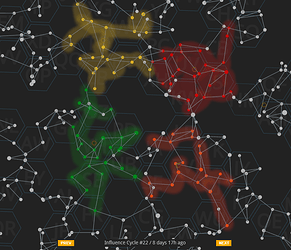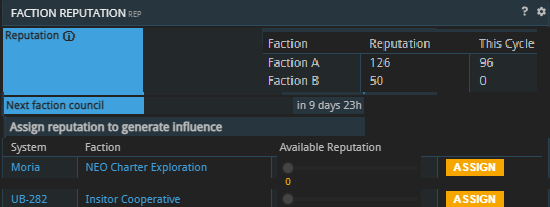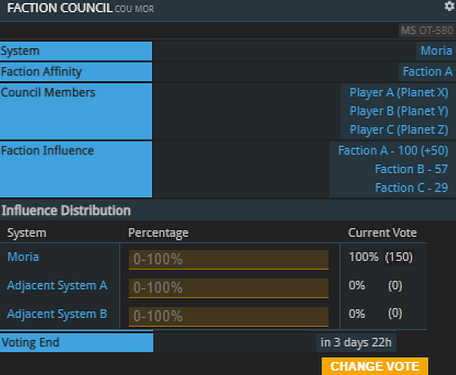After the introduction of gateways, one of the next big features we’d like to tackle is faction-wide politics. In a way, this will be our version of introducing “conflict” and a constant back-and-forth between factions. Our plans are to strengthen faction identity and give giving politics something tangible to strive towards, other than “keep things running as efficiently as possible”. While the decision-making regarding this feature will largely fall into the hands of political actors, such as governors and members of parliament, every single player will be able to participate. And certainly, coordinating among as many players as possible within your faction, and not just between the different governments, will pay off.
Here’s a quick overview of the system we’re envisioning: Players generate faction influence via their reputation with each faction. Faction councils of all the governments within a system come together in regular intervals to distribute this influence between their own and adjacent systems. Building up enough influence of one faction within a system continuously can cause it to change its faction affinity, affecting the universe map, currencies and policies in a certain area.
Earning Faction Reputation & Influence
Players will now be able to earn faction reputation with each faction, not just their own. As usual, one way to do so is fulfilling faction contracts, which will now be offered from foreign factions as well. Additionally, running production lines on a faction planet with many content workers will be a new way to increase your reputation with the respective faction. Holding political offices will generate additional reputation on top.
In between faction councils, you will be able to assign your faction reputation to any (faction-space) system you own a base in. This assignment converts your reputation into faction influence to be used by the political actors of the system during the voting face of their faction council.
Note that choosing between all the systems you’re associated with is each individual player’s call. So faction-wide coordination, and potentially the mobilization of “slumbering” influence supplies, will be key to your own faction’s expansion or overcoming another faction’s plans.
Faction Councils
In regular intervals, all governments within a system come together as a faction council to vote on how to distribute the influence generated by players. They will have their own system-wide group chats to coordinate and make plans.
In practice, each council member will create their own suggested influence distribution and the one applied in the end will be an average of all the suggestions. So again, a coordinated effort with everyone following a shared plan will be the most efficient and ensure as little as possible influence goes “astray”.
Note that, as most of the ideas presented here, the details are still very much in flux and subject to change based on feedback or testing. For example we’re thinking of weighing the average by the population sizes each council member is responsible for instead of simply just calculating the raw average from all suggested influence distributions.
Influence Shifts
After the faction council voting period ended (which naturally happens at the same time for all systems in the universe), faction influence will be moved between systems according to the final distributions.
At this point the new faction influence values are determined for each system. Note that additional factors might come into play here, such as defensive infrastructure (Counter Influence Agency). Additionally, pre-existing influence values will “decay” if no new influence is added externally for a long time (which could even result in a system losing its faction affinity altogether).
That said, now we can, for all systems, determine whether there are any changes in terms of which faction is the dominating influence in a system!
Faction Affinity Changes
Any system where the strongest faction influence is not the same as the system’s current faction affinity will change their affinity to that new faction. Note that we are still determining how immediate that change is going to be. For example we’re considering a “threatened” status in case the influence differences are relatively small, and only an already threatened system would then be able to actually change its affinity.
A system changing its faction affinity will for example affect its local rules (and their limits in it had no affinity before), its currency (likely not immediately but via a “currency adjustment motion” from the government) and potential “foreign-faction production levies”. The latter are another thing we’re considering introducing to strengthen the overall faction identity. While any producer within faction space would have to pay a certain amount to the local faction, players belonging to another faction are subject to higher levies, and thereby incentivized to stay within their own (or outside any) faction’s space.
Of course the faction spread will be visualized via an updated map display mode for the classic strategy game feeling of “painting the map in your color”, and to allow you to plan your counter-moves for the next cycle.
As usual, please let us know what you think of this idea! We read every post and will take your opinions, suggestions and concerns into account while developing the concept further!
See you in APEX!



